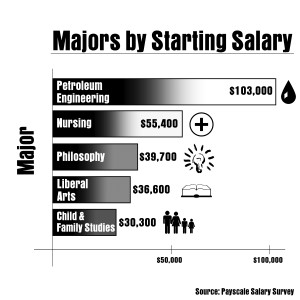Some people think majoring in philosophy is impractical, but others believe there are hidden benefits.
“A great myth of our day is that philosophy does not lead to a high paying position,” said Dr. Todd Buras, associate professor of religion.
According to the Journal of Economic Education, philosophy majors lead all other majors on the Law School Admission Test, often leading to careers in law.
Also, a graph from the Wall Street Journal said the average starting salary for mid-career philosophy graduates without higher degrees in 2008 was $81,200, beating out chemistry, political science and business majors.
Other statistics from the Educational Testing Service showed philosophy majors score highest on both the verbal and analytical writing aspect of the Graduate Record Examinations.
“Employers want someone who can make a logical argument,” Buras said. “They want someone who can boil complicated ideas down and answer tough questions.”
Not everyone, however, agrees that employers want to hire philosophers.
Parker, Colo., junior Drake Gates, a physics major, said philosophy is unnecessary unless a person plans to teach.
“Entry-level positions make or break your future,” he said. “They provide you with a task. Philosophy trains you to ask why but not how to do something.”
Where some see philosophy as theoretical, Buras said philosophy guides action. He said what a person believes influences what that person does.
“Everything I would be doing would be different if I thought there was no God,” he said. “Philosophy is a practical plan for living well.”
Buras was drawn to philosophy because he wanted to answer the big questions about faith.
“I had heard the saying ‘Smart people outgrow God,’” he said. “That bothered me.”
Buras said studying philosophy gave him the opportunity to develop his faith.
Buras is not the only one who chose to study philosophy in an attempt to address life-defining questions.
Ames, Iowa, doctoral candidate Chris Tweedt said before studying philosophy, everything else he did was unsatisfying.
“I found myself sitting in front of a computer screen doing monotonous things, but I had all these questions I wanted to understand,” he said.
Tweedt said it is helpful for anyone to take a class in logic or moral philosophy.
“Philosophy helps people better articulate their views,” he said.
Tweedt is a father of three, all of whom are under the age of 5.
He said his studies in philosophy have made him a better parent, and he recommends studying philosophy to anyone who plans to be a parent.
“Children learn how to ask questions at an early age,” he said. “They always ask ‘Why?”
Tweedt said many parents are tempted to answer children’s questions quickly, but studying philosophy allows for the important process of contemplation.
“Thinking ahead makes you more consistent,” he said.
Buras said those who want to incorporate philosophy into their lives often do not know what that entails — whether it means thinking in solitude or debating in public. He said it is great to question what philosophy, which is the Greek work for “love of wisdom,” looks like.
“I define philosophy as integrating all the things you know into a coherent understanding of yourself and your world and how you need to fit into it in order to flourish,” he said.
Buras said if he had a megaphone and could send any message to Baylor students, it would be that they need to reflect on all the knowledge they gain.
He emphasized the importance of having meaningful conversations.
“Start a dialogue,” he said. “The biggest questions are the ones we don’t know the answer to. Just because we don’t know the answer, does not mean the answer is not there.”
Anyone interested in philosophical conversations can join the philosophy club on 4 p.m. on Thursdays in Morrison Hall.
More information can be found on the club’s Facebook page or on the Baylor philosophy department website.



